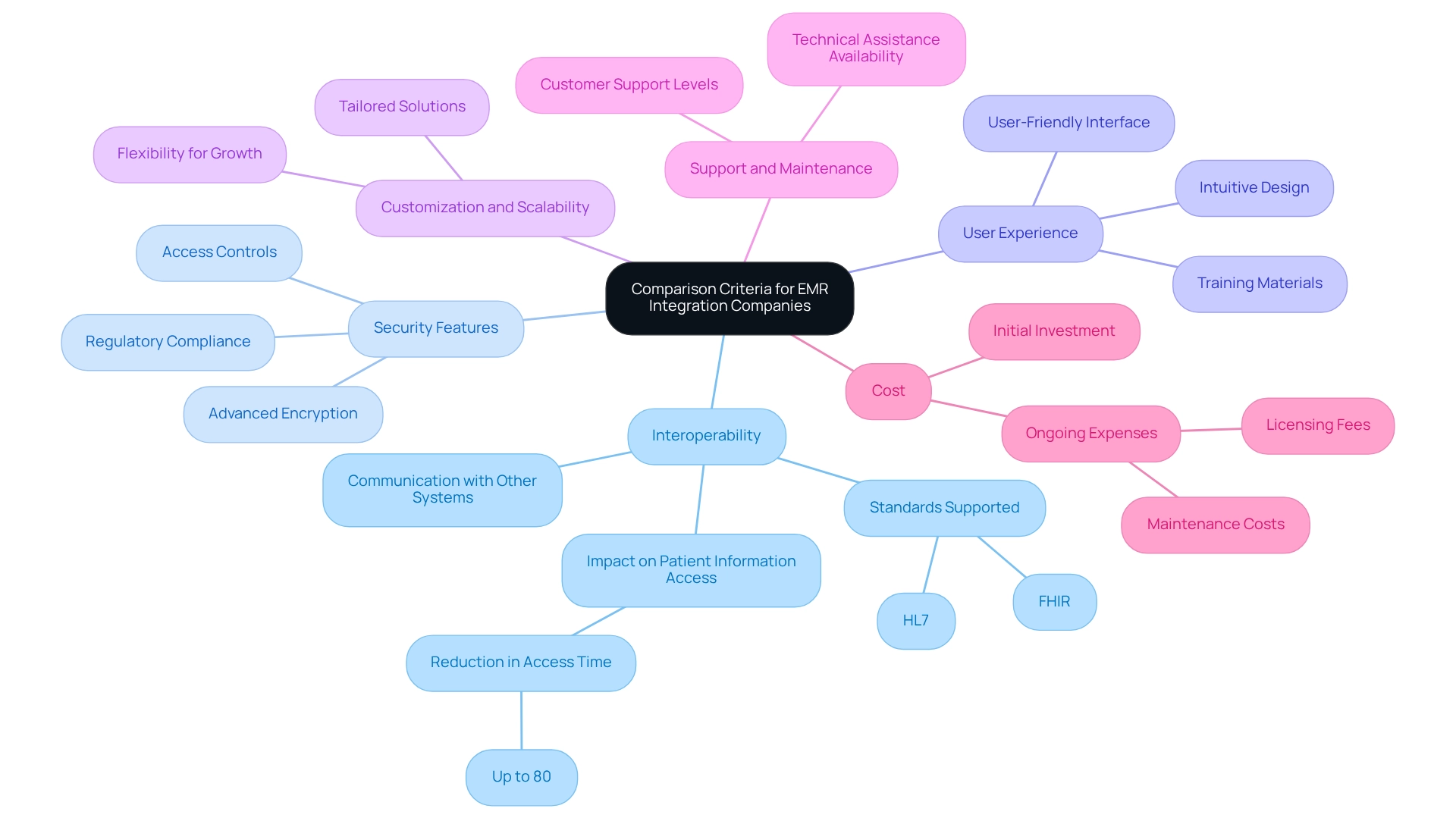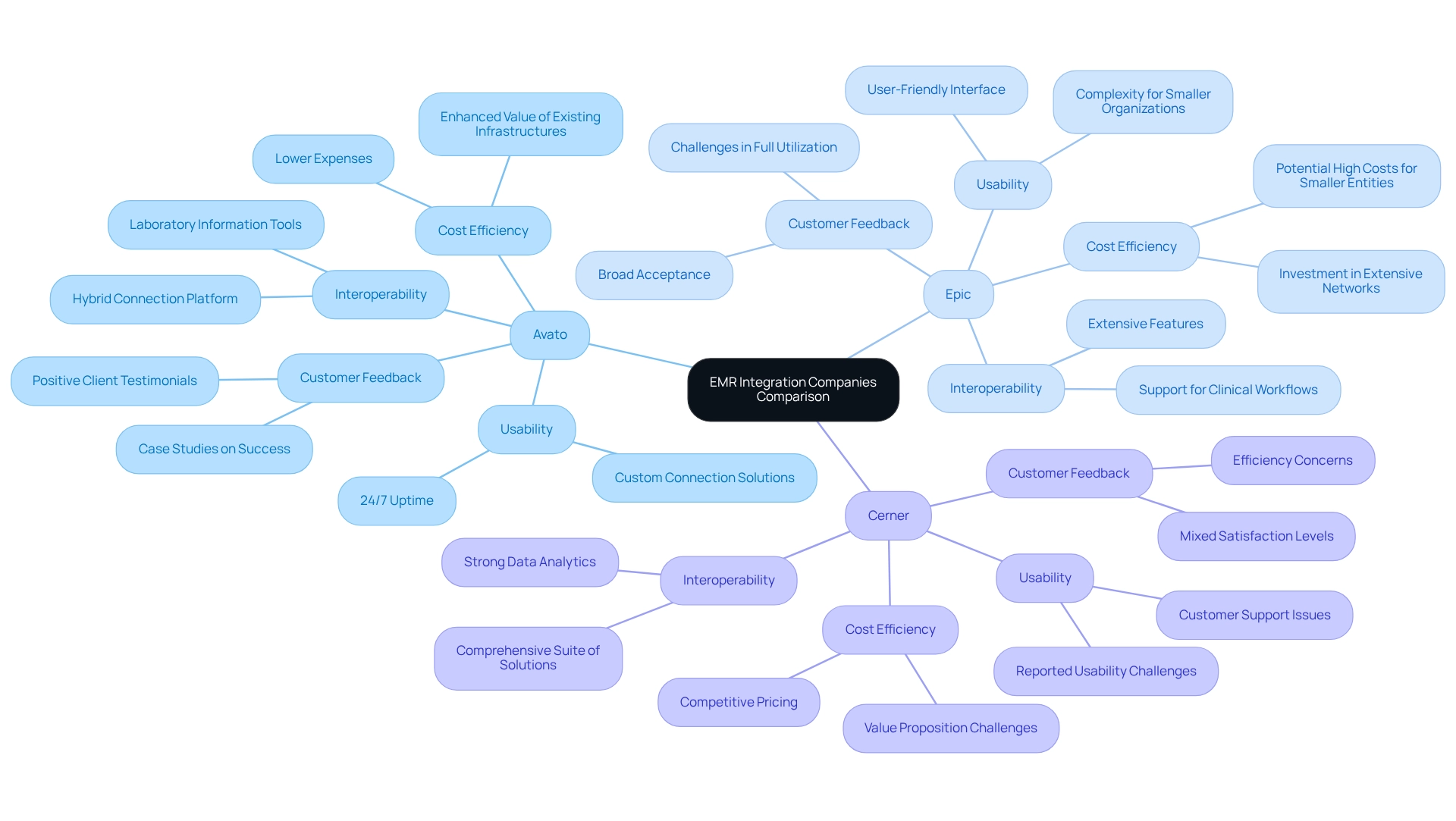Overview
Evaluating EMR integration companies is crucial. We recognize that key factors include:
- Interoperability
- Security features
- User experience
- Customization and scalability
- Support and maintenance
- Cost
These criteria are not just boxes to check; they are essential for ensuring effective data exchange, safeguarding patient information, and enhancing overall operational efficiency. Ultimately, this leads to improved patient care outcomes. What’s holding your team back from making the right choice? By prioritizing these factors, we can ensure that your integration platform not only meets your needs but exceeds expectations.
Introduction
In the rapidly evolving landscape of healthcare, we recognize that the integration of Electronic Medical Records (EMRs) stands as a critical component in enhancing patient care and operational efficiency. As we strive for seamless communication across diverse medical systems, the benefits of effective EMR integration become increasingly apparent.
This article delves into the importance of EMR integration, highlighting its role in:
- Improving clinical decision-making
- Reducing administrative burdens
- Ensuring compliance with regulatory standards
Furthermore, we provide a comparative analysis of leading EMR integration companies, offering insights into the criteria for selecting the right partner for successful integration.
With the demand for sophisticated solutions on the rise, understanding the nuances of EMR integration is essential for healthcare organizations aiming to modernize their operations and ultimately enhance patient outcomes.
What’s holding your team back from achieving these goals? Let us guide you through the complexities of EMR integration to unlock the full potential of your healthcare delivery.
Understanding EMR Integration: Importance and Benefits
The EMR connection is the cornerstone of modern medical systems, facilitating seamless communication among diverse clinical software and significantly enhancing the quality of patient care. By integrating Electronic Medical Records (EMRs), we enable healthcare providers to access comprehensive patient data in real-time, which is essential for informed clinical decision-making and improved care coordination. The advantages of effective EMR amalgamation are numerous:
- It reduces administrative burdens.
- Enhances data accuracy.
- Bolsters patient safety.
Notably, hospitals utilizing fully integrated Electronic Health Records (EHR) report the lowest rates of inpatient mortality, readmissions, and patient safety incidents. A study shows that 448,767 patients benefited from these improved outcomes, underscoring the positive impact of unification on patient care.
Furthermore, robust EMR coordination is vital for compliance with regulatory standards, ensuring that patient information is securely managed and readily accessible when required. As the medical landscape continues to evolve, the necessity for efficient EMR integration companies becomes increasingly apparent. At Avato, we are committed to building technological foundations that empower medical organizations to streamline the integration of various platforms through our hybrid connection platform, which is supported by EMR integration companies and features real-time data synchronization, customizable workflows, and strong security protocols. This not only enhances operational efficiency but also fosters the development of rich, interconnected customer experiences.
A recent study highlighted usability challenges in EMR systems, revealing that poor usability can compromise care quality, thus emphasizing the need for user-friendly technology in medical environments. Additionally, Castellanos et al. observed a slight increase in profit in the year following the launch of the PDMS, indicating that EMR integration can also yield financial benefits. As we approach 2025, the demand for advanced solutions from EMR integration companies will only grow, making it a critical factor for medical organizations striving to modernize their operations and elevate patient care.
Comparison Criteria for EMR Integration Companies
When evaluating EMR integration companies, we must consider several essential criteria that will guide our assessment:
- Interoperability: The ability of the EMR system to communicate seamlessly with other medical systems is paramount. Our solutions support widely adopted standards such as HL7 and FHIR, which are vital for effective data exchange. Our hybrid integration platform excels in this area, enabling organizations to unlock isolated assets and enhance interoperability. The increasing focus on interoperability has led to significant advancements, with EHR implementations reportedly reducing the time required to access patient information by up to 80%. As Robin Leahy, Vice President of Compliance, observes, “Interoperability is already making a significant impact on the medical sector.”
- Security Features: Given the sensitive nature of medical data, robust security measures are essential. We advocate for solutions that incorporate advanced encryption, stringent access controls, and compliance with industry regulations to safeguard patient information. Our commitment to security in our integration solutions ensures that data remains protected throughout the integration process.
- User Experience: A user-friendly interface can greatly influence adoption rates among healthcare staff. Comprehensive training materials and intuitive design are crucial for enabling users to navigate the platform efficiently, thereby improving overall productivity. Our dedication to customer-focused solutions guarantees that user experience is a top priority in our service offerings.
- Customization and Scalability: The ability to tailor the EMR system to meet specific organizational needs and to scale as the organization grows is critical for long-term success. Our hybrid unification platform provides the flexibility necessary to adapt to changing demands without sacrificing functionality, enabling companies to secure their operations for the future.
- Support and Maintenance: We evaluate the level of customer support provided, including response times and the availability of technical assistance. Our expert merging services ensure that businesses have access to proficient collaboration partners, offering dependable assistance to minimize downtime and resolve any issues swiftly.
- Cost: We must consider both the initial investment and ongoing expenses, such as licensing fees and maintenance costs. A thorough cost analysis will help ensure that the chosen solution aligns with budget constraints while delivering value.
Incorporating these criteria into our evaluation process will facilitate informed decision-making, ultimately leading to enhanced interoperability and improved patient care outcomes, which is crucial for EMR integration companies. We encourage organizations to discuss their needs with our analysts for tailored solutions that best fit their operational requirements.

Comparative Analysis of Leading EMR Integration Companies
In this comparative study, we evaluate three prominent EMR integration companies, including Epic and Cerner.
Avato stands out with its hybrid connection platform, expertly linking legacy systems with contemporary applications, particularly in regulated sectors such as medical care. Our commitment to minimizing downtime and ensuring 24/7 uptime is crucial for critical operations, making us a trusted choice for sectors including banking, healthcare, and government. The platform supports 12 levels of interface maturity, enabling customized connection solutions that effectively balance speed and sophistication. This adaptability proves advantageous for organizations navigating intricate connectivity environments. Notably, our platform lowers expenses while enhancing the value of existing infrastructures, facilitating effective connections that can release data and networks in weeks. Feedback from clients, such as Tony LeBlanc of the Provincial Health Services Authority, highlights our solution’s ability to accelerate the unification of isolated frameworks and fragmented information, providing the connected foundation organizations require to simplify, standardize, and modernize. Furthermore, as Maggy Bobek Tieché notes, “Developers are progressively including features like laboratory information tools for oncology management, operating room software, and other advanced connectivity programs to encourage interoperability among hospitals and related care locations,” emphasizing our commitment to improving interoperability. Specific case studies demonstrate our ability to deliver results within tight time frames and budget constraints, solidifying our position as a strong contender among EMR integration companies.
Epic, a dominant player in the EMR space, is celebrated for its extensive interoperability features and user-friendly interface. Its solutions are broadly embraced by extensive medical networks, providing strong assistance for clinical workflows. However, the complexity of Epic’s offerings can present challenges for smaller organizations, potentially hindering their ability to fully leverage the platform’s capabilities.
Cerner is recognized for its comprehensive suite of healthcare solutions, which includes strong data analytics capabilities. While it provides outstanding connectivity features, some users have reported challenges related to system usability and customer support, which can affect overall satisfaction and efficiency.
Overall, we set ourselves apart by emphasizing security and speed, making Avato an attractive option for organizations looking to modernize their connection processes. Our capacity to streamline intricate projects and produce outcomes within strict time limits and financial restrictions is further validated by several case studies showcasing the success of EMR integration companies in medical environments.

Recommendations: Choosing the Right EMR Integration Partner
Choosing the appropriate EMR integration companies as collaboration partners is essential for medical organizations like ours that are seeking to improve operational efficiency and compliance. We must consider several key factors to guide our decision-making process.
- First, we need to assess our needs. Conducting a comprehensive evaluation of our organization’s unification requirements is crucial, taking into account existing systems and future objectives. This foundational step ensures that our chosen solution aligns with our strategic goals.
- Next, we should evaluate vendor experience. It is vital to prioritize vendors with a strong background in medical integration. Their familiarity with the regulatory landscape, including compliance with standards such as HIPAA, is essential for navigating the complexities of medical data management, particularly for EMR integration companies. Trevor McElhaney, the Director of Consulting at DoctorsManagement, LLC, emphasizes the importance of ensuring that the EHR/EMR system adheres to applicable healthcare regulations and standards, including the Health Insurance Portability and Accountability Act (HIPAA) in the U.S. A dedicated hybrid connectivity platform exemplifies a vendor that understands these complexities and is committed to enhancing business value through seamless data connection.
- We must also request demos and trials. Engaging potential partners by requesting demonstrations of their solutions provides invaluable hands-on experience, offering insights into usability and functionality that can significantly impact our daily operations. Avato’s platform is designed to streamline digital transformation, making it easier for organizations like ours to manage integration needs effectively.
- Furthermore, checking references and reviews is critical. Speaking with current users of the EMR platforms under consideration can provide us with essential feedback on assistance and performance, offering insights into the vendor’s reliability and effectiveness.
- In addition, we should consider a long-term partnership. Seeking a vendor that is committed to ongoing support and innovation not only guarantees stability but also promotes continuous enhancement in our unification efforts, allowing us to adapt to changing industry requirements. Avato’s commitment to designing technological frameworks establishes it as one of the leading EMR integration companies, particularly in providing hybrid connectivity solutions for legacy infrastructures in regulated sectors.
- We must also understand the regulatory context. Being aware of new regulations, such as those adopted by the European Union, which emphasize data privacy and security in EHR systems, is vital for ensuring that our chosen partner can meet these evolving standards.
By adhering to these optimal methods, we can make knowledgeable choices that enhance our coordination abilities and ultimately improve patient care with the support of EMR integration companies. Significantly, effective EMR collaboration has been demonstrated to decrease the time needed to retrieve patient information by as much as 80%, highlighting the importance of choosing a competent partner. For instance, the case study ‘Revolutionizing Patient Intake for athenahealth Users’ illustrates how Klara’s innovative solutions greatly enhanced healthcare efficiency, underscoring the concrete advantages of successful incorporation.
Get your copy now to learn more about how Avato can assist us in navigating the complexities of EMR integration and structured requirements management.
Conclusion
The integration of Electronic Medical Records (EMRs) is a pivotal element in the modernization of healthcare systems. We recognize that effective EMR integration significantly enhances clinical decision-making, reduces administrative burdens, and ensures compliance with regulatory standards. By providing healthcare providers with real-time access to comprehensive patient data, we improve care coordination and promote patient safety, as evidenced by the positive outcomes reported by hospitals utilizing fully integrated systems.
Furthermore, our comparative analysis of leading EMR integration companies underscores the importance of choosing the right partner. Factors such as:
- interoperability
- security features
- user experience
- customization
- ongoing support
are critical in evaluating potential vendors. Avato stands out with its commitment to enhancing operational efficiency and security, making it a strong contender for healthcare organizations looking to modernize their integration processes.
As the demand for sophisticated EMR solutions continues to rise, understanding the nuances of integration becomes essential for healthcare organizations striving to improve patient care and navigate the complexities of the evolving healthcare landscape. By prioritizing effective EMR integration, we can unlock the full potential of our healthcare delivery systems, ultimately leading to better patient outcomes and operational success. The time to act is now—embracing these technologies is key to shaping the future of healthcare.

